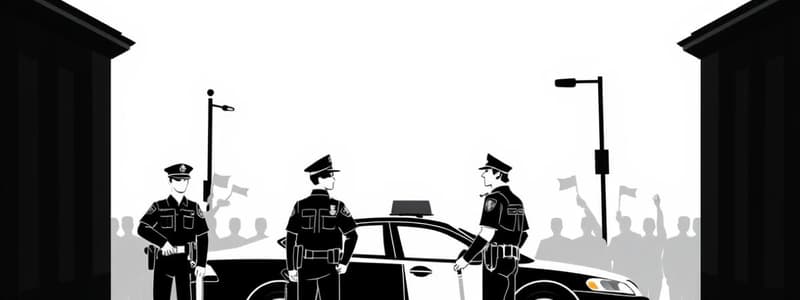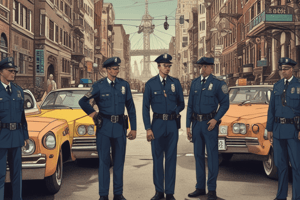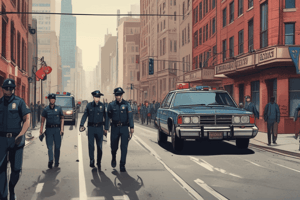Podcast
Questions and Answers
What is the typical time frame for a civil liability case against police to reach final disposition?
What is the typical time frame for a civil liability case against police to reach final disposition?
- 3 to 10 years (correct)
- 1 to 2 years
- 10 to 15 years
- Immediately after the incident
Which of the following is NOT considered a common form of intentional tort against police?
Which of the following is NOT considered a common form of intentional tort against police?
- Negligence (correct)
- False arrest
- Assault and battery
- Wrongful death
Which of these elements is NOT required to establish a case of negligence against police?
Which of these elements is NOT required to establish a case of negligence against police?
- Witness testimony (correct)
- Proximate cause
- Actual damage or injury
- A legal duty
What percentage of police encounters could potentially lead to civil litigation?
What percentage of police encounters could potentially lead to civil litigation?
What typically defines a frivolous lawsuit?
What typically defines a frivolous lawsuit?
Which of the following is a consequence of police officers having an exaggerated fear of personal liability?
Which of the following is a consequence of police officers having an exaggerated fear of personal liability?
What percentage of civil liability suits against police are estimated to be lost?
What percentage of civil liability suits against police are estimated to be lost?
Which statement about civil suits against police is accurate?
Which statement about civil suits against police is accurate?
What does the special duty of care refer to in law enforcement?
What does the special duty of care refer to in law enforcement?
Why does general duty of care seldom result in liability for self-inflicted injuries?
Why does general duty of care seldom result in liability for self-inflicted injuries?
What is necessary for a plaintiff to prove in a negligence lawsuit against police?
What is necessary for a plaintiff to prove in a negligence lawsuit against police?
In terms of police supervision, what have some courts ruled regarding detainees with potential for self-harm?
In terms of police supervision, what have some courts ruled regarding detainees with potential for self-harm?
What has been ruled concerning contributory negligence in cases involving police and suicides?
What has been ruled concerning contributory negligence in cases involving police and suicides?
What generally happens as more legal principles become established regarding police conduct?
What generally happens as more legal principles become established regarding police conduct?
How do courts typically respond to changes in police and civil liability?
How do courts typically respond to changes in police and civil liability?
What standard do courts use to evaluate police behavior?
What standard do courts use to evaluate police behavior?
What must a defendant show to succeed in a motion for summary judgment?
What must a defendant show to succeed in a motion for summary judgment?
In what case did the Supreme Court define 'Color of Law' in the context of Section 1983 actions?
In what case did the Supreme Court define 'Color of Law' in the context of Section 1983 actions?
Which legal principle suggests that police have no general duty to protect the public from harm?
Which legal principle suggests that police have no general duty to protect the public from harm?
What may lead to government liability for third-party criminal victimization under the Special Relationship Doctrine?
What may lead to government liability for third-party criminal victimization under the Special Relationship Doctrine?
What is the legal implication when police give assurances of protection but fail to act?
What is the legal implication when police give assurances of protection but fail to act?
Which of the following is NOT one of the four legal aspects of police duty?
Which of the following is NOT one of the four legal aspects of police duty?
According to the principle of contributory negligence, what happens if a plaintiff's conduct contributes to their injury?
According to the principle of contributory negligence, what happens if a plaintiff's conduct contributes to their injury?
What did the courts rule in Buffkins v. City of Omaha regarding the treatment of suspects?
What did the courts rule in Buffkins v. City of Omaha regarding the treatment of suspects?
What is the term for the legal distinction that protects public officials from liability in certain situations?
What is the term for the legal distinction that protects public officials from liability in certain situations?
What distinguishes a 'special relationship' that may impose a duty on law enforcement?
What distinguishes a 'special relationship' that may impose a duty on law enforcement?
Flashcards are hidden until you start studying
Study Notes
Trends in Police Civil Liability Litigation
- Civil suits against police have sharply increased since the 1960s.
- There is a rising success rate in civil litigation against law enforcement.
- Numerous judgments against the police have occurred, even when officers had good records.
Negative Effects and Fears of Civil Liability
- Civil liability fears can lower morale within police departments.
- Erosion of effective policing is a consequence of heightened liability concerns.
- Officers may become alienated from the public, affecting community relations.
- There are barriers to understanding complex policing issues due to liability fears.
Time Frame for Civil Liability Cases
- Civil liability cases generally take between 3 to 10 years from the incident to resolution.
Direct Verdicts and Judgments of Law
- A direct verdict is granted when no evidence can support the jury’s verdict.
Civil Litigation Statistics
- About 0.1% of police encounters with individuals suspected of crimes may lead to civil litigation.
- Only 4 to 8% of civil suits are lost by police officers.
- Approximately 25% of civil cases against law enforcement settle outside of court.
Elements of Negligence
- Four elements to establish negligence include: legal duty, breach of duty, proximate cause, and actual damage or injury.
Common Intentional Torts Against Police
- Frequent intentional torts include wrongful death, assault and battery, false arrest, invasion of privacy, and intentional infliction of emotional distress.
False Arrest Claims
- To claim false arrest, it must be established that police willfully detained an individual without authority and against their will.
Invasion of Privacy Criteria
- Invasion of privacy claims require intrusion, a highly offensive action, and that there was a legitimate expectation of privacy.
Officer Liability Trends
- An estimated 15% to 25% of police officers will face lawsuits during their careers.
Frivolous Lawsuits
- A lawsuit is deemed frivolous if it has no arguable basis in law or fact.
Effects of Civil Liability Fear on Police Behavior
- Unrealistic fears of liability can lead police officers to become timid, indecisive, or deterred from making arrests.
Legal Doctrines and Police Liability
- Police have no general duty to protect the public under the Public Duty Doctrine unless a "special relationship" exists.
- Under the Special Relationship Doctrine, liability may arise when the state has custody over an individual.
Qualified Immunity in Police Liability
- Qualified immunity often protects police in abandonment cases, such as leaving vehicle occupants stranded.
Case Law on Warrantless Search and Seizure
- Landmark cases include:
- Terry v. Ohio (1968) for Stop and Frisk
- Carroll v. US (1925) for vehicle searches based on probable cause
- Horton v. California (1990) regarding plain view searches
- Maryland v. Buie (1990) for protective sweeps.
Police Assurance of Protection
- Police departments can be liable if they fail to act on assurances of protection made to individuals, particularly those who relied on such assurances during heightened danger.
Four Zones of Negligence
- Zones include justifications for pursuit, operation of vehicles, situational variables, and external influences affecting police conduct.
Contributory Negligence
- Contributory negligence can bar recovery if the plaintiff's actions contributed to their injury.
Duty of Care Factors
- Police have a special duty to care for individuals in their custody, regardless of their incarceration status.
Foreseeability of Self-Harm
- Courts consider the foreseeability of self-harm based on various factors, influencing liability assessments.
Police Breach of Duty and Supervision
- Breach of special duty must be proven in negligence claims against police, often related to the level of supervision provided to detainees.
Evolution of Legal Principles
- As legal principles evolve, officers may find it harder to claim qualified immunity for acts of misconduct.
- Courts tend to reflect societal changes rather than lead reform, often adhering to established norms of "reasonable and prudent" police conduct.
Studying That Suits You
Use AI to generate personalized quizzes and flashcards to suit your learning preferences.




